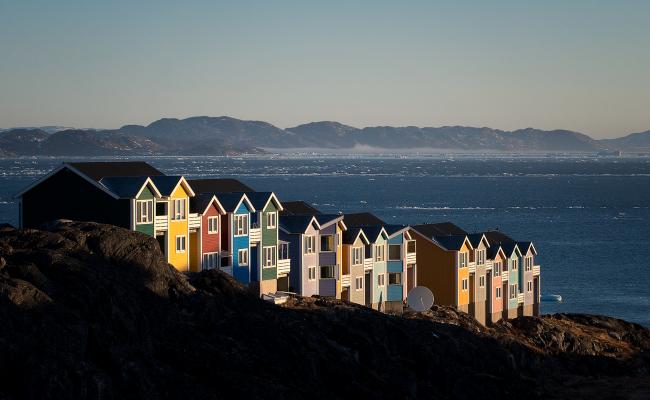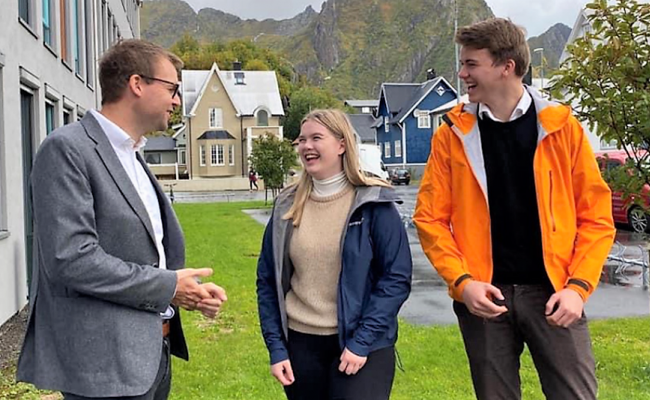Op-Ed: Unexplored resources for EU Arctic policy: Energy, oceans and space

Elana Wilson Rowe, Rasmus Gjedssø Bertelsen, Mariia Kobzeva and Andreas Rapotnik on the EU Arctic Policy. (Photo: Nupi/UiT/High North News)
“We believe there should be more EU in the Arctic and more Arctic in the EU” , says Antti Rinne, former Finnish Prime Minister.
The EUs current Arctic policy from 2016 focuses on climate and environmental protection, sustainable development and international cooperation. The EU has followed up with contributions to research and international cooperation in these areas.
However, the EU’s engagement in the Arctic is overlooked internally – with the Arctic perceived of as a marginal arena for policy action – and externally – with a lack of broader recognition for the EU’s Arctic efforts and contributions.
We suggest that the EU has perhaps defined its Arctic policy approach - and understood Arctic governance - too narrowly. Arctic policy has been a niche concern in Brussels, and this has resulted in a focused and consistent approach, but involved too few EU actors in Arctic policymaking.
Consequently, the EU has unwittingly limited its role in the Arctic and made it even more difficult to formulate a convincing narrative about what the EU has to do with and in the Arctic.
In our view, there are three broader policy areas that have untapped potential for giving additional ballast to the EU as an Arctic actor: energy, ocean and space governance.
Energy:
Around 24% of oil and gas consumed in the EU comes from the Arctic, and Russia’s Arctic in large part. The Arctic accounts for 10% of Russia’s BNP and about 20% of export income.
Western Europe has been a longstanding customer of Russia and the Soviet Union, importing gas from northwest Russia through pipelines crossing eastern and central Europe. These are now meant to be replaced with Nordstream 1 and 2 under the Baltic Sea directly connecting Russia and Germany.
Natural gas production in Russia’s Arctic is set to develop further in the coming years, with support from Europe. The Yamal LNG-project, with a price tag of of 27 billion USD originally had an investment structure consisting of Novatek (Russia, 60%), Total (France, 20%) and China National Petroleum Corporation (20%).
The Western sanctions regime put in place after the Ukraine crisis limited financing from western sources, resulting in 9.9% of Novatek’s share going to the Silk Road Fund (a major Chinese state investment fund).
Europe is also the destination for the LNG produced on Yamal, with the project delivering with tank skips both westward to European ports and through the Northern Sea Route to Asia.
The Yamal project has been followed up by the Arctic LNG2 project and LNG terminals on the Kola Peninsula and Kamchatka, also with support from Total. The takeaway here is that EU energy policy, Russia’s Arctic energy resources, Total’s activities and Nordstream 1 and 2 are a real part of the EU’s Arctic politics – if not yet a part of an articulate Arctic policy.
The EU’s energy, ocean and space policies should be considered explicitly in the ongoing redesign of the EU’s Arctic policy.
Ocean governance:
Similarly, ocean governance and policy are necessarily part of the EU’s Arctic politics. The EU Commission has common fisheries policymaking procedures and negotiates access to fish quotas in the North Atlantic and Barents Sea.
The EU Commission is also part of the 2018 agreement creating a moratorium on commercial fisheries in the Central Arctic Ocean, until a baseline of science and management knowledge about these potential fish stocks is established.
Here, the EU is a signatory alongside Canada, the Kingdom of Denmark, Norway, Russia, USA, Island, Japan, China and South Korea.
The Arctic states and northern indigenous peoples have achieved significant progress on the governance challenges that have and will accompany an increasingly more open and trafficked Arctic.
This progress includes binding agreements amongst Arctic states on search and rescue responsibilities and oil spill pollution preparedness and response. On a more global stage, Canada, Norway and Russia were central actors shaping the International Maritime Organization (IMO)’s Polar Code.
Despite the policy ‘home’ of Arctic issues in DG MARE (Maritime Affairs and Fisheries), the EU has not sufficiently connected its Arctic interests to its role as an international maritime actor.
This is especially surprising as the EU is also home to 1/3 of the world’s merchant fleet and has extensive coordination amongst member states on environment, maritime safety maritime security/rule of law and promoting novel and longstanding maritime industries.
EU policymakers should consider how their prominence in global oceans governance – and the role of EU companies in the maritime industries - can be managed to contribute to an Arctic increasingly open to global traffic.
Private sector initiatives, such as in the work happening under the UN Global Compact, could benefit from a more prominent and coordinated European approach.
Also read
Space:
Finally, the EU is becoming a significant actor in space governance with the Galileo satellite navigation system and the Copernicus earth observation satellite system. The EU’s independent space infrastructure brings significant degrees of strategic autonomy.
And space governance and Arctic governance are closely related. Satellite navigation and earth observations are essential for operating in the Arctic – from civilian traffic to the military operations – and for grasping the climatic changes that are transforming the Arctic.
EU as a space actor and owner and operator of such significant infrastructure can make important contributions to Arctic communities relating to communications, data-sharing, and creating global attention to the findings of earth observation.
The EU’s energy, ocean and space policies should be considered explicitly in the ongoing redesign of the EU’s Arctic policy. What consequences does the significant import of energy from Russia’s Arctic and European participation in the Russian Arctic energy sector have for EU Arctic policy?
How does and can the Arctic (especially the North Atlantic, the Barents Sea and the Central Arctic Ocean) overlap with broader European policies and areas of strength in ocean governance? What are the research, economic, civilian and security possibilities that the Galileo and Copernicus systems give the EU in the Arctic?
Until these questions are considered and answered, the EU runs the risk of undermining its own policy relevance in the region.






